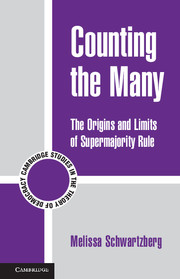Book contents
- Frontmatter
- Dedication
- Contents
- Acknowledgments
- 1 Introduction
- Part I A Remedy for the Problems of Unanimity
- 2 Prelude: Acclamation and Aggregation in the Ancient World
- 3 Unanimitas to a Two-Thirds Vote: Medieval Origins of Supermajority Rule
- 4 Unanimity and Supermajority Rule in Eighteenth-Century France
- Part II A Remedy for the Problems of Majority Rule
- References
- Index
2 - Prelude: Acclamation and Aggregation in the Ancient World
Published online by Cambridge University Press: 05 June 2014
- Frontmatter
- Dedication
- Contents
- Acknowledgments
- 1 Introduction
- Part I A Remedy for the Problems of Unanimity
- 2 Prelude: Acclamation and Aggregation in the Ancient World
- 3 Unanimitas to a Two-Thirds Vote: Medieval Origins of Supermajority Rule
- 4 Unanimity and Supermajority Rule in Eighteenth-Century France
- Part II A Remedy for the Problems of Majority Rule
- References
- Index
Summary
It may seem surprising to begin a study of supermajority rule in ancient Greece. Athens did not use supermajority rules, and the earliest documented use of such norms does not seem to be until the second century BCE in Rome. Although inquiry into many democratic institutions rightly begins in the great laboratory of democracy that was classical Athens, supermajority rules seem to be an important exception. Why turn to Greece, and to the circumstances in which the counted vote emerged?
The choice among majority, supermajority, and unanimity rule only emerges after a prior decision to count votes – and so the development of the counted vote in ancient Greece is the subject of this chapter. Here I shall argue that the assignment of a “counted” or “aggregated” vote conferred dignity on those rendering decisions: it was originally an “aristocratic” institution, designed to assess the independent votes of those, and only of those, who possessed a special and superior faculty of political judgment. In contrast, acclamation was a mechanism for the masses, lacking such developed faculties and not worthy of having their judgments counted discretely. Only with the rise of democracy in Athens did the view emerge that ordinary citizens merited a counted vote.
- Type
- Chapter
- Information
- Counting the ManyThe Origins and Limits of Supermajority Rule, pp. 19 - 48Publisher: Cambridge University PressPrint publication year: 2013

